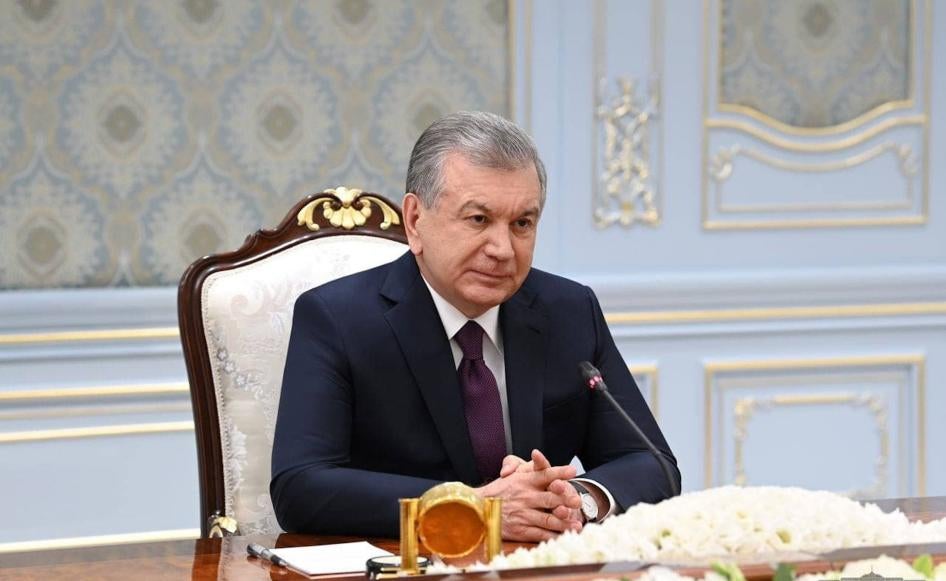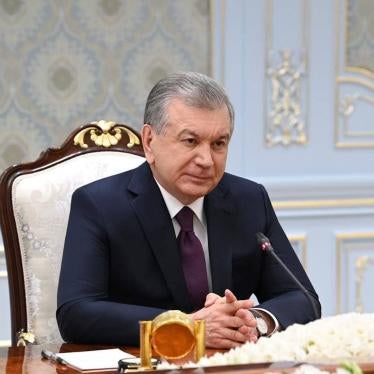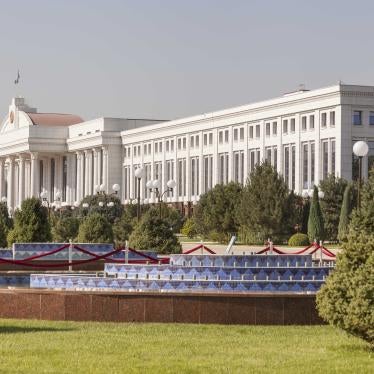On October 24, 2021, Uzbekistan will hold its first presidential election since President Shavkat Mirziyoyev came to power in September 2016, following the death of Islam Karimov, the country’s longtime authoritarian president.
Uzbekistan has garnered significant international attention in recent years for taking steps to improve its reputation and move away from its rights-abusive past. These steps include tackling state-organized forced labor in the country’s cotton fields, releasing people imprisoned on politically motivated charges, registering some independent nongovernmental organizations, and accrediting some international media.
Yet, Uzbekistan’s political system is still deeply authoritarian. No genuine opposition parties have been allowed to enter politics in recent years. Since the start of the year, promised human rights reforms have stalled, and in particular in the months leading up to the presidential election, there has been clear backtracking in some areas. No election in Uzbekistan has been deemed to be free or fair by international election monitors.
The following questions and answers provide an overview of the human rights context in which Uzbekistan’s upcoming presidential election is taking place.
What are independent election monitors saying so far about Uzbekistan’s presidential election on October 24?
The Organization for Security and Co-operation in Europe’s Office for Democratic Institutions and Human Rights (OSCE/ODIHR) election observation mission has engaged a team of 289 observers, consisting of 11 core experts, 28 long-term observers, and 250 short-term observers from OSCE participating states to monitor Uzbekistan’s upcoming presidential election. OSCE/ODIHR noted in its interim report issued on October 8 that Uzbekistan has taken some steps to revise its electoral framework in line with ODIHR recommendations, including “a simplified notification procedure for campaign events, some safeguards against the misuse of office during campaigning, elimination of parallel dispute resolution avenues, and a new interim campaign finance report requirement.”
Notably, however, OSCE/ODIHR, the region’s major election-monitoring body, underscored that Uzbekistan has failed to address many long-standing recommendations related to “shortcomings in the protection of fundamental rights and freedoms.” In particular, ODIHR noted “limitations on suffrage rights, restrictions on independent candidacy and alternative sources for campaign financing, and provisions allowing for citizen observers” as issues that remain unaddressed.
In its October report, and in an earlier needs assessment report from May, OSCE/ODIHR noted input from interlocuters regarding restrictions on political participation and a difficult atmosphere for media coverage. In its May report, interlocuters in Uzbekistan spoke to monitors about the “burdensome registration requirements and wide discretionary powers of the Ministry of Justice (MoJ) for denial of registration of political parties as well as civil society organizations, potentially resulting in a lack of pluralistic views.” In its October report, interlocuters flagged “recent improvements in the media climate” but shared concerns regarding “intimidation and harassment of journalists and bloggers, a restrictive legal framework for the media and blocking of some websites of international media outlets and human rights organizations.”
So, who is running in the presidential election?
Under Uzbekistan’s Constitution, candidates for president must be nominated by registered political parties. They must be 35 or older, speak Uzbek, and have been living in Uzbekistan for the last 10 years. Uzbek law denies independent candidates the right to run in presidential elections, contrary to international standards and OSCE commitments.
Uzbekistan currently has five registered political parties, all of which have nominated candidates for president.
The incumbent president Shavkat Mirziyoyev’s Liberal Democratic Party nominated him to run for a second term in early September. The People’s Democratic Party nominated the only woman candidate, Maksuda Vorisova, who is deputy chairperson of the party’s central council. Uzbekistan’s Social Democratic Party “Adolat” nominated Bakhrom Abdukhalimov, who is the party's leader, while the nationalist Democratic Party “Milliy Tiklanish” nominated its party leader, Alisher Kadirov, as its candidate. The Ecological Party of Uzbekistan also nominated its party leader, Narzulla Oblomorodov.
All five parties are considered to be pro-government, operating within and fully adhering to the political confines defined by the president and his government. As such, none of the candidates is expected to present a serious challenge to President Mirziyoyev’s hold on power. In its October 8 report, ODHIR noted that “[s]o far, there has been no direct or meaningful engagement between contestants.”
Two other potential candidates, linked to unregistered opposition political parties, had announced their intention to run for president. However the authorities prevented them from becoming official candidates, despite the government’s claims that these elections are the “logical continuation of the ongoing large-scale democratic reforms in the country.”
Khidirnazar Allakulov, a government critic and former university rector, announced in June 2020 the formation of a new opposition party, the Truth and Development Party (Haqiqat va Taraqqiyot). Earlier in 2021, Allakulov also announced that he would run for president. Although Uzbek authorities harassed party supporters and interfered in their efforts to collect the signatures for registration, the party persisted and filed for registration with the Justice Ministry. The ministry denied the Truth and Development Party registration on multiple occasions, claiming it had come up short on the required number of signatures.
Radio Ozodlik reported in early April that “many supporters” had told them that they had been “forced by local authorities across the country to withdraw their signatures.” Human Rights Watch is separately aware of several people who received direct threats from the police to withdraw their support for the party’s registration.
The Erk Democratic Party, another unregistered opposition party, announced in April its intent to nominate Jahongir Otajanov, a popular singer, as its candidate for president. The Erk Democratic Party has tried repeatedly in recent years to officially resume its political activities, to no avail. Erk Party supporters have also faced harassment by Uzbek authorities in recent months. In July, Otajanov announced he was stepping down from politics completely.
Uzbekistan has opened up in recent years, and ODIHR notes that presidential elections are being held “in the context of economic, social, and political reforms.” But has Uzbekistan’s reform agenda actually led to meaningful human rights improvements?
Uzbekistan today is not the same country as five years ago, but over the last year, and especially in recent months leading up to presidential elections, the president’s reform agenda has significantly stalled, with backtracking in key areas. Uzbekistan’s political system remains deeply authoritarian.
There has been a significant decline in respect for freedom of speech and the media in recent months, with the authorities targeting outspoken and critical bloggers with spurious criminal charges. Many of the government’s promised legislative reforms, such as new codes on criminal law, the operations of nongovernmental groups, and peaceful assemblies, have all stalled. A new law concerning the operation of religious groups adopted in July fell far short of international standards and failed to incorporate key recommendations from international human rights bodies, including the UN special rapporteur on freedom of religion and belief.
In recent years, the government has introduced changes that it claims ease the registration process for nongovernmental groups. Uzbek authorities also claim that civil society organizations “are becoming a full partner of the state” and that “measures are being taken to increase their role and importance.” Yet the Justice Ministry repeatedly denies registration to independent groups on trivial and technical grounds.
In recent years Uzbekistan has released more than 50 people, including human rights defenders and journalists, who were imprisoned under the former president on politically motivated charges. But they have been freed without restoration of their pre-conviction rights and status, and have not received adequate medical treatment for health issues connected to their detention.
One area in which Uzbekistan’s reform efforts have succeeded in bringing about some concrete improvements is with respect to forced labor in the cotton sector. In January, the International Labour Organization (ILO) concluded that there had been no systemic forced or child labor in the 2020 cotton harvest. However, the ILO found that the number of people that “were subject to direct or perceived forms of coercion,” still amounted to four percent, or approximately 80,000 people. In addition, the lack of independent trade unions and civil society organizations in Uzbekistan to protect workers’ rights and monitor the government’s compliance with the ban on forced labor undermines the overall progress the government has made on this issue.
Respect for freedom of speech and the media is a key component of a free and fair elections. What’s the situation in Uzbekistan?
Over the last five years, there has been a noticeable increase in media activity in Uzbekistan. Internet restrictions have been eased and social and economic issues are now commonly discussed on social media. Uzbek authorities have also granted accreditation to several foreign correspondents, including Eurasianet, Voice of America, and the BBC. In its October report, ODIHR noted that interlocuters in Uzbekistan had described “improved access to information and an increased possibility to critically report on some social and political issues” along with concern about “longstanding issues.”
Media outlets still have to operate within boundaries set by the government that do not correspond to international standards, and this year, Uzbek authorities have tightened controls over freedom of speech and the media. In March, Uzbekistan introduced legal provisions criminalizing online criticism of the president. Journalists and bloggers have faced harassment, prosecution, and assault for trying to do their job. While defamation or insult no longer can lead to prison terms, both remain criminal offenses, despite the president’s promises last year to decriminalize them. In June, the Ministry of Foreign Affairs denied accreditation to Agnieszka Pikulicka, a Tashkent-based foreign correspondent.
The authorities have increasingly targeted bloggers with spurious criminal charges in recent months. In May, a Surkhandaryo court sentenced the outspoken blogger Otabek Sattoriy to six-and-a-half years in prison on dubious slander and extortion charges. Despite significant public outcry, his sentence was upheld on appeal in July.
A Tashkent-based blogger, Miraziz Bazarov, who has publicly alleged government corruption and has supported lesbian, gay, bisexual, and transgender (LGBT) rights, was attacked by a mob in March and hospitalized with a broken leg. The authorities brought politically motivated charges of slander against Bazarov once he was discharged and placed him under house arrest. The authorities have not held anyone accountable for the attack on Bazarov.
In August, the blogger and government critic, Valijon Kalonov, was arrested on charges of insulting the president through mass media after he criticized the president and called for a boycott of the upcoming election.
What is the role of civil society organizations in monitoring elections in Uzbekistan? What restrictions do human rights defenders face in Uzbekistan?
While Uzbek law allows observers from international organizations, political parties, neighborhood committees, and media representatives to monitor elections, citizen observers, including human rights defenders and representatives of unregistered civil society groups, are not permitted to formally monitor elections.
The authorities also continue to hinder and obstruct the work of independent organizations by subjecting them to excessive and burdensome registration requirements, undermining the right to freedom of association.
The Justice Ministry has also repeatedly denied registration to independent rights groups, often on trivial grounds, including groups working on sensitive political and human rights issues. Without registration, the groups are not permitted to legally work in the country. In April, the Humanitarian Legal Center in Bukhara was denied registration for the ninth time. The volunteer youth group Oltin Qanot (“Golden Wing”) has been denied registration 21 times. In September, after being denied registration for the eighth time, the founders of the rights group Human Rights House filed a lawsuit against the Justice Ministry.
What other human rights issues remain of concern in the country?
A draft criminal code, published by the Prosecutor General’s office in February, retains many problematic articles, including provisions that define and address extremism and incitement in an overly broad manner, that are inconsistent with international human rights standards.
The problem of torture and ill-treatment persists in detention. Both human rights groups and the media have reported credible allegations of torture this year. Although Uzbek authorities said in 2019 that they had shuttered the notoriously abusive Jaslyk prison, the local human rights group Ezgulik reported in April that up to 100 people may still be imprisoned there.
On May 25, the United Nations Working Group on Arbitrary Detention, a UN expert body, issued an opinion in the case of Kadyr Yusupov, a former Uzbek diplomat who was sentenced to five-and-a-half years in prison for treason in January 2020 and who alleged that he had been tortured in detention. The UN Working Group found that Yusupov was arbitrarily deprived of his liberty and said the Uzbek government should “take urgent action to ensure [Yusupov’s] immediate release.” He remains in prison.
Men in Uzbekistan who engage in consensual same-sex sexual conduct face arbitrary detention, prosecution, and imprisonment under article 120 of the criminal code, which carries a maximum sentence of three years in prison. The new draft criminal code retains the offense, with the wording unchanged, under article 154. Gay men also face homophobia, threats, and extortion by both police and private parties. Uzbek police and courts have relied on the conclusions of forced anal examinations conducted between 2017 and 2021 to prosecute gay men for consensual same-sex relations. Such exams are a form of torture, according to the World Health Organization.
Muslims who practice their faith outside state controls continue to be targeted by authorities with spurious religious extremism-related criminal charges. In early July, Uzbekistan adopted a new religion law “On Freedom of Conscience and Religious Organizations.” Officials did not make public the draft law before it was adopted, nor did the new law reflect recommendations issued by international human rights bodies.
In a joint July 29 communication to President Mirziyoyev, five UN special rapporteurs expressed serious concern about provisions in the law, such as the prohibition of all forms of peaceful missionary activity and the banning of non-state-approved religious education and manufacture, import, and distribution of religious material.









